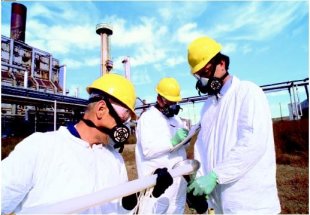
Environmental Protection Careers
 Careers in environmental protection involve jobs that help reduce the negative environmental impacts of today's actions, restore damaged ecosystems to health, or build sustainable ways of life for the future. Fifty years ago, most of today's environmental careers did not exist. Today, the field of environmental jobs is one of the fastest-growing job markets; there are more than one hundred environmental-protection careers to consider—ranging from environmental law, politics, journalism, and education, to highly technical and scientific jobs in such fields as environmental engineering, biology, chemistry, and architecture.
Careers in environmental protection involve jobs that help reduce the negative environmental impacts of today's actions, restore damaged ecosystems to health, or build sustainable ways of life for the future. Fifty years ago, most of today's environmental careers did not exist. Today, the field of environmental jobs is one of the fastest-growing job markets; there are more than one hundred environmental-protection careers to consider—ranging from environmental law, politics, journalism, and education, to highly technical and scientific jobs in such fields as environmental engineering, biology, chemistry, and architecture.
What happened to create so many new jobs in environmental protection? The environmental movement happened. During the past half century, American society began to adopt a new set of environmental values. The public also started to explore the idea that people could often save money—and sometimes even make money—by protecting the environment.
As a result of the environmental movement, environmental advocates and legislators worked together to create a large infrastructure of environmental laws and regulations to protect the environment and human health. New regulations called for policymakers, lobbyists, citizen monitors, attorneys, managers, and conservationists to make and enforce new policies. Scientists, engineers, and other specialists were enlisted to study problems and develop and implement solutions to problems such as oil spills, air pollution, landfills, and contaminated ground water.
As new technological advances were developed to combat ongoing crises, new environmental occupations emerged. By the beginning of the twenty-first century, over $400 billion was spent annually worldwide on environmental protection, supporting hundreds of thousands of interesting jobs.
Opportunities for Almost Every Interest
Today, many people can find careers in environmental protection that match their personal skills and dreams. For example, someone interested in working outdoors might choose to become a conservation biologist, park ranger, wildlife manager, or forester. A person who enjoys working with the public might explore working as an outreach specialist in environmental education,
Workers testing and analyzing ground water. ( ©David Sailors/Corbis. Reproduced by permission
©David Sailors/Corbis. Reproduced by permission
Some of today's hottest careers are in environmental sciences, environmental law, environmental business, conservation, environmental engineering, environmental communications, environmental lobbying, and the social sciences. Yet, like any job, the demand for experts in any field of environmental protection can rise or fall.
Environmental Career Opportunities
Environmental protection occupations fall into five categories:
- Environmental research
- Environmental outreach: education, communications, and advocacy
- Natural resource management
- Environmental engineering and sciences
- Environmental policy and legislation and regulation171
Environmental Research and Teaching
Environmental research is conducted by scientists and science technicians who study all aspects of the environment.
Jobs include:
- Ecologists
- Biologists
- Zoologists
- Biochemists
- Aquatic biologists
- Marine biologists
- Botany
- Microbiologists
- Physiologists
- Air specialists
Sample Jobs
- Zoologists study all animals. Their research focuses on life processes, diseases, behavior, and other features of the animal world.
- Microbiologists study the growth and characteristics of microscopic organisms such as bacteria, algae, and fungi.
- Ecologists study the interactions between organisms and their environment.
Environmental Outreach: Education, Communications, Advocacy, and Fundraising
Environmental communications specialists are responsible for communicating knowledge about the environment to the public, the government, and private businesses. Environmental outreach specialists can be found teaching in schools, helping firms understand environmental goals, interpreting nature at state parks, writing for publications, and lobbying legislators.
- Environmental educators
- Environmental journalists
- Communications specialists
- Interpretive naturalists
- Environmental advocates
- Technical writers
- Organizers
- Lobbyists
- Fund-raisers
Sample Occupations
- Environmental educators teach the public about the environment. Environmental educators are hired to work in schools, nature centers, and in industry.
U.S. EPA. Reproduced by permission.
)

















